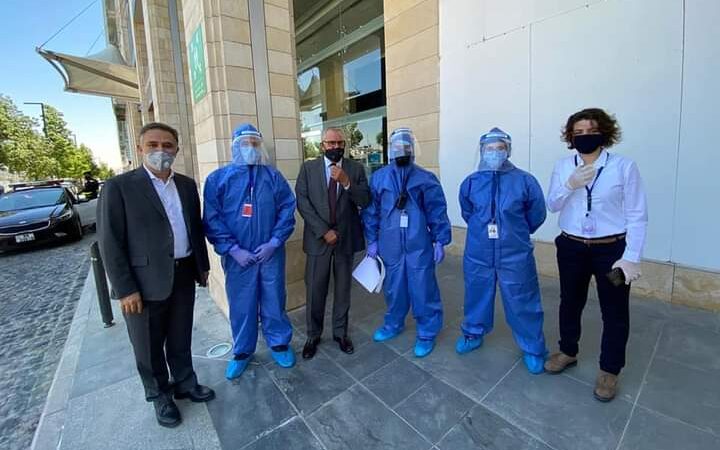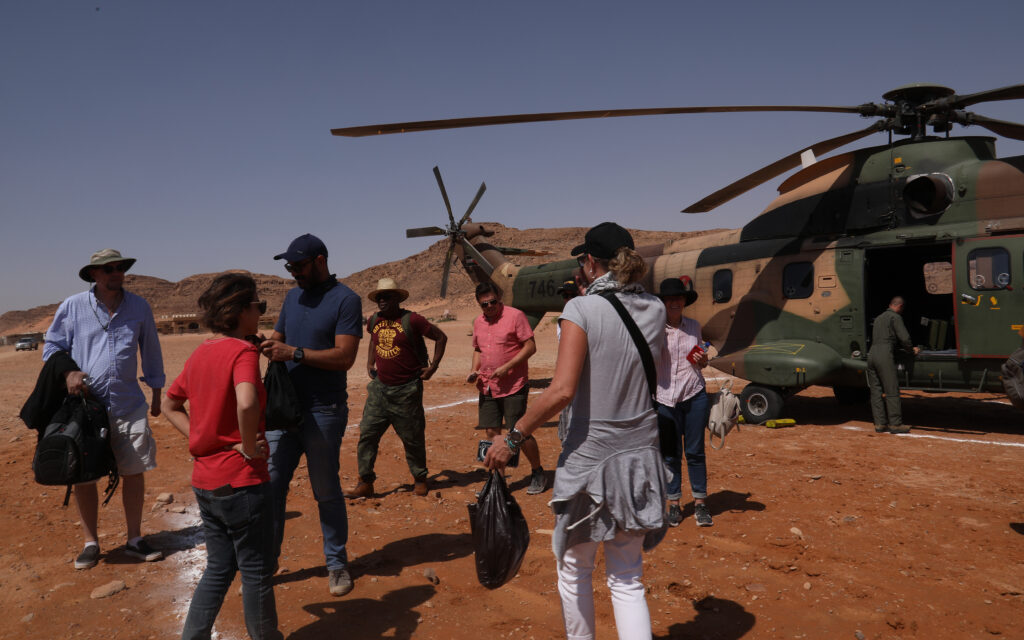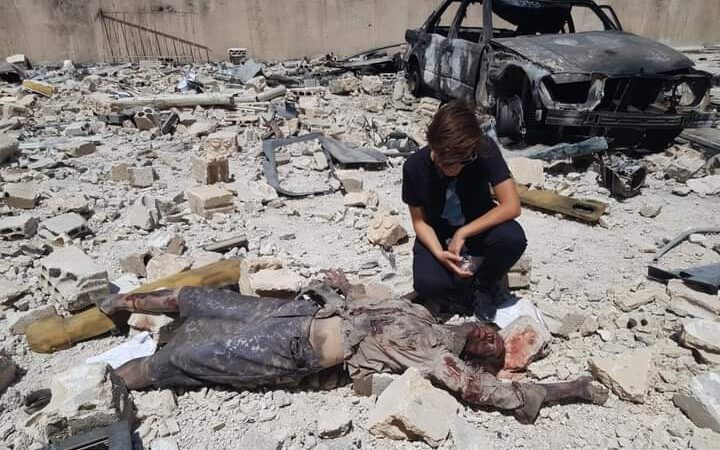Jordan and Filmmaking
Filmmaking is a craft business as much as an art and it requires not only creativity but also technical, financial, juridical skills. Jordan is a country that still lacks film universities and training companies, but there is strong state support that can make attractive cooperation conditions between local and international filmmakers. Linda Shrafi is one of the young employees of the Royal Film Commission – Jordan, she is the coordinator of production and film industry relations. She told us some insight about their work, as well as expressed willingness for new international cooperation experiences.
Seg – What’s the general condition of the Jordanian film industry?
Linda – The Jordanian film industry has witnessed a noticeable boom in 2019. In the last quarter of that year, 45 foreign productions and 438 local productions were shot in Jordan. It was expected that the number of productions, jobs, and spending in Jordan to triple, however, the restrictions of the COVID-19’s pandemic have interrupted that growth. Despite this, Jordan has managed to be one of the first few countries in the world to welcome international productions to film in the Kingdom during the pandemic while applying safety measures.

Seg – Could you briefly present film projects currently being produced in Jordan that show the potential of international co-production?
Linda – There are several promising productions taking place in Jordan that are at different stages of their production process (i.e., scouting, pre-production, and wrap). However, we cannot disclose any information in compliance with the RFC’s confidentiality policy and as agreed on with these productions. That being said, we are expecting a bigger number of film productions to take place in 2021, as several international producers have expressed their interest in film in Jordan.
Seg – Do you think the Royal Film Commission Jordan was flexible enough to adapt to the new global reality and recover its effective work in the times of Covid-19 pandemics?
Linda – The RFC issued guidelines for the audio-visual sector detailing safety and precautionary measures to limit the spread of the Coronavirus (COVID-19) for filming in Jordan. These guidelines aim to secure a safe working environment for local and foreign productions filming in the country during and after the pandemic.

The guidelines detail a set of mandatory requirements, including conducting tests, maintaining social distancing, minimizing the number of people on set, organizing arrivals and entry to set, and providing suitable accommodation for film crews. This resulted in 2020 being a special year for the industry, even though the number of productions and employment opportunities was lower than in the past years. Despite that, we have managed to keep operations running for four big productions. This involves three international and one local, including a very big Korean production and a Jordanian Netflix original.
Seg – To what extent are young people involved in the film production processes? Do you have effective film schools and is the older generation welcoming the newcomers?
Linda – We see a great deal of enthusiasm and passion from young generations for cinema and filmmaking. However, there is a considerable lack of schools and universities that offer diplomas in film studies both in Jordan and in the region as a whole. There is also a lack of organizations that provide training programs specialized in the various aspects of the filmmaking process. This is where our role as the RFC comes into play. We do our best to offer many workshops and training programs for the industry’s newcomers and aspiring filmmakers from Jordan and the region. We focus on different components and stages of the filmmaking process, to help them advance their skills and refine their talents.
Though it is not always the case, we do notice a sizable gap between the older and the young generation joining the industry. That is another thing that we hope to work on and improve with time. We believe that the key to successful and sustainable film industry in the region is to connect different generations and have them exchange their experiences with one another. We, as an industry, will surely grow if we can achieve harmony between these generations and their visions.
Seg – Do you have success stories of young filmmakers’ initiatives on the national or international level? Would you remember inspiring examples?
Linda – A tremendous number of inspiring stories come out of our region, and there are so many creative and passionate people working in the Arab cinema today. There is, undoubtedly, a great deal of curiosity surrounding our region; international audiences are always interested to know more of our stories and hear the voices of the people living here. With that spirit, The RFC came up with the project “Anthology Film: Women in the Maghreb-Mashreq Region.” This was carried out in the framework of the United Nations, Educational, Scientific & Cultural Organization’s (UNESCO) regional project “Enhancing a gender responsive film sector in the Maghreb-Mashreq region”, with the support of the European Union.
A feature-length anthology film was produced, titled “Chronicles of Her”. Through this project, the RFC targeted Arab filmmakers from the region, who are relatively new to the industry. This allowed them to tell their stories to the rest of the world as well as to express themselves and their own experiences through art. More about “Chronicles of Her” can be found on the website of the movie.

Seg – How the interested film professionals can find more information about the Jordanian film project and can contact you/authors?
Linda – The RFC’s website has all the information, including e- services. For more information about the filming procedures and the productions that were filmed in Jordan, you can also check our location gallery. This shows how Jordan is being highly acclaimed as a unique filming location that attracts cinema and television productions from around the world. For inquiries related to production services, please contact us via email.
Seg – As a post-scriptum to our interview, would you please tell your story of how you got employed at the Royal Film Commission Jordan being a representative of youth? Was it easy to find your place in the film industry? (you can include your professional background if you wish).
Linda – On a personal level, I always had a deep interest in the film industry. I remember very well the day I applied for a job at the Royal Film Commission. I was looking for a job online and I found a vacancy for a Production Assistant position. I got super enthusiastic as soon as I checked the terms of reference and I applied for the job straight away. A few days later, I received a call from the Human Resources department informing me that I have been shortlisted for the job and I need to do a test before conducting a two-tier interview with the HR and the Managing Director. Since then, it has been a very exciting journey for me. Currently, I am the Production and Film Industry Relations Coordinator.
The whole experience with the RFC has been eye-opening for me. My job can only be described as truly exceptional. I am confident that I will have a very promising future career path in this industry.

One of the best experiences I had working with the RFC so far was my participation in the American Film Market. This opportunity deepened my knowledge in the film and production industry. More importantly, it allowed me to have the ultimate Hollywood experience, which, I believe, is a dream of millions of people worldwide!
Moreover, throughout the past four years, I had the chance to do some actual work on the ground like visiting sets and film sites, understanding the process of film making, and meeting interesting people such as worldly celebrated producers, directors, actors, and celebrities like Will Smith!
Finally, I have to say while it is a very exciting job, it is nonetheless a very challenging one as well. Indeed, being a Coordinator in this industry means that you need to do your best to remain available 24/7 to deal with any upcoming issues and help facilitate processes during the shooting whenever is needed. However, at the end of the day, this is what I enjoy doing the most! I can definitely see my future self working and growing in the same field.
Interview by Seg Kirakossian
Photos are from the personal archive of Linda Shrafi
